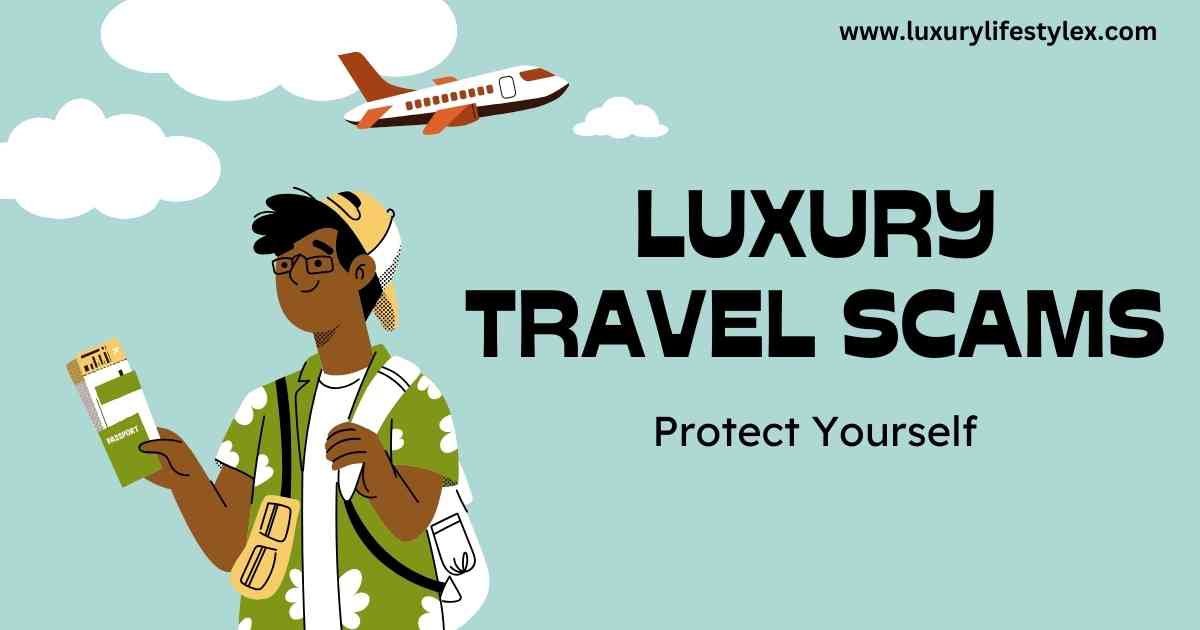Introduction
As you plan your luxury travel experience, you must be aware of the potential risks and scams in the industry, such as tourist scams and fake travel agencies. Luxury travel scams range from deceptive ‘free’ vacation offers to fraudulent rental listings and counterfeit travel documents. Scammers often prey on individuals’ desires for exclusive experiences and exploit their trust.
To avoid falling victim to these scams, it’s essential to educate yourself about the common tactics employed by scammers and take proactive steps to protect your personal information with data encryption. By following the expert advice and tips in this guide, you can ensure that your luxury travel experience remains unforgettable for all the right reasons.
Common Luxury Travel Scams
Scammers continually devise new strategies to deceive unsuspecting travellers. By familiarizing yourself with common luxury travel scams and travel fraud, you can better protect yourself from potential pitfalls. Here are some prevalent scams to watch out for:
“Free” Vacations
You may receive enticing advertisements or unsolicited calls, emails, or texts offering a ‘free’ vacation. However, these offers often come with hidden fees and taxes, making the vacation far from free. Legitimate companies never ask you to pay for a prize that is supposed to be free, so this could be a red flag for a vacation scam.
Robocalls Offering Discounted Vacation Deals
Beware of robocalls claiming to offer discounted vacation deals. Unsolicited robocalls are generally illegal and a hallmark of travel agency scam operations. If a company contacts you without your written permission, avoiding engaging with them is best.
International Travel Document Scams
Individuals seeking international travel documents may fall prey to travel agency fraud, where scammers operate fraudulent websites that mimic official government portals. These deceptive sites levy exorbitant fees for visas or passports, services that are often free or much less expensive through legitimate channels.
International Driving Permit Scams
An international driving permit (IDP) is a must-have for driving abroad, yet travel agent scam artists may try to sell counterfeit IDPs or offer them at exorbitant prices. Acquiring a fake IDP can result in legal troubles and disrupt your travel plans. Only purchase IDPs from authorized organizations like the U.S. Department of State, AAA, or AATA.
Vacation Home Scams
The surge in vacation rental popularity has given rise to scammers who exploit travellers by hijacking actual rental agreements or fabricating non-existent ones. They falsely advertise properties they don’t own or double-book rentals, leaving travellers without a place to stay and out of pocket.
Charter Flight Scams
While exclusive charter flights to sought-after destinations may be appealing, travel agent scams can trick you into paying for flights and vacation packages that don’t exist. To verify a charter flight’s authenticity, refer to the U.S. Department of Transportation’s list of approved public charter flights.
Recognizing Warning Signs
To protect yourself from travel insurance scams, it’s vital to identify warning signs and remain vigilant. Recognizing these red flags can help avoid becoming entangled in luxury travel scams. Here are some warning signs to keep an eye on:
“Free” Offers with Hidden Costs
Be sceptical of supposedly ‘free’ offers yet require upfront payment for fees or taxes, as this is a hallmark of a travel insurance scam. Constantly scrutinize the fine print and challenge any charges that come out of the blue.
Vague or Incomplete Information
Be cautious of travel offers that omit crucial details. Genuine travel companies will always provide thorough information about your trip’s accommodations, transportation, and other critical components. If an organizer is vague about these details, it’s wise to be wary and do additional research.
Unusual Payment Methods
To facilitate identity theft, scammers often request wire transfers, gift cards, or cryptocurrency payments. These payment methods are difficult to trace and offer scammers a way to collect money without the possibility of refunds. To protect your personal information, avoid making payments through these channels.
High-Pressure Sales Tactics
If you’re feeling rushed or pressured to make an immediate decision on a travel package or rental, it’s a warning sign that your personal information may be at risk. Legitimate companies will give you ample time to consider your options and won’t pressure you to commit hastily.
Unrealistically Low Prices
If a luxury vacation rental or package with significantly lower prices than comparable offerings seems too good, exercise caution to avoid vacation scams. Scammers often use below-market rates to lure unsuspecting travellers into their schemes.
By remaining vigilant and recognizing these warning signs, you can better protect yourself from travel fraud and luxury travel scams.
Tips to Avoid Luxury Travel Scams
Protecting yourself from luxury travel scams and online risks requires proactive measures. Here are some essential tips to help you avoid falling victim to these scams:
Research and Due Diligence
Before booking any travel arrangements, conduct thorough research on the company, hotel, or rental property. Look for online reviews and testimonials from trusted sources. Verify the company’s legitimacy by checking its credentials and affiliations with reputable travel associations, such as the Skylux travel bag.
Payment Methods and Security
Use secure payment methods when making travel bookings. Credit cards offer protection against fraudulent charges and the possibility of a Skylux travel refund in case of scams. Avoid making payments via wire transfers, gift cards, or cryptocurrency, as these methods offer little recourse if you encounter fraudulent activity.
Trusted Recommendations
To avoid fake travel agents, seek recommendations from trusted sources such as friends, family, or travel experts. Their firsthand experiences can provide valuable insights and help you sidestep potential scams. Additionally, consult reputable travel forums and websites to gather information and recommendations from a wider community of travellers.
Reading the Fine Print
Carefully review all terms and conditions, including cancellation and refund policies, before finalizing any bookings. Be aware of hidden charges or additional fees that may not be immediately apparent in rental agreements. Ensure you fully understand the company’s policies to avoid unpleasant surprises.
Travel Insurance Considerations
Consider purchasing travel insurance from a reputable provider to protect yourself from a travel insurance scam. Please read the policy carefully to understand what it covers, including cancellations, medical emergencies, and other unforeseen circumstances. Ensure the policy aligns with your needs and protects your luxury travel plans adequately.
Booking with Reputable Companies
Choose well-established and reputable companies when booking luxury travel arrangements to avoid travel agency fraud. Look for industry certifications, such as BBB accreditation or state registration for travel agencies. These credentials ensure that the company operates ethically and adheres to industry standards.
Credit Card Protection
When making significant purchases, such as luxury travel arrangements, using a credit card offers protection against travel agent scams. Most credit card companies provide fraud protection and the ability to dispute charges. In case of fraudulent activity, your credit card company can assist you in recovering your funds.
Reporting Luxury Travel Scams
If you believe you have encountered a luxury travel scam, you must report it to the appropriate authorities to combat travel fraud. By reporting scams, you can help prevent others from falling victim to similar schemes. Here are some steps to follow when writing a luxury travel scam:
- Contact the Federal Trade Commission (FTC) through their online reporting platform at ReportFraud.ftc.gov. Provide as much detail as possible about the scam and the individuals involved.
- Contact your state attorney general’s office and inform them about the scam. They may provide further guidance on reporting and assist in investigating the matter.
By reporting luxury travel agency scams, you contribute to the collective effort of combating fraudulent activity and protecting fellow travellers.
Conclusion
Luxury travel scams can cast a shadow on your dream vacation. However, armed with knowledge and proactive measures, you can safeguard against these vacation scam tactics and ensure a truly exceptional travel experience. Research extensively, recognize warning signs, and make informed decisions when booking luxury travel arrangements. By following these guidelines, you can relax and enjoy the luxury vacation you deserve, free from the worry of falling victim to scams.
Travelling in luxury should be an indulgence, not a cause for concern. Stay vigilant, take precautions, and embark on your journey confidently, knowing you’ve taken the necessary steps to protect yourself from tourist scams.
FAQs
Q1: How can I protect myself from luxury travel scams?
A1: Be cautious of deals that seem too good to be accurate and constantly research the company offering the luxury travel package.
Q2: What are common signs of online travel booking scams?
A2: Watch out for fake travel websites, be cautious with online payments, ensure e-visas are official, and avoid falling for free air ticket offers.
Q3: How can I avoid scams when booking through a travel agency?
A3: Be wary of cheap travel offers from suspicious websites or social media ads, and always verify the agency’s legitimacy before booking.
Q4: What precautions should I take before committing to travel arrangements?
A4: Look up travel companies, hotels, rentals, and agents with the words “scam,” “review,” or “complaint” to see what others say about them before committing.
Q5: Are there specific scams to watch out for while travelling in Europe?
A5: Europe has its share of tourist scams, including fake petitions and overpriced services. Familiarize yourself with common scams to avoid falling victim.











